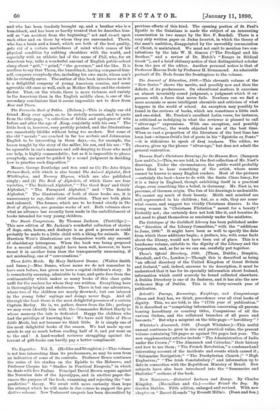The Journal of Education, 1889. — This eleventh volume of the "
New Series " shows the merits, and possibly now and then the defects, of its predecessors. On educational matters it exercises an almost invariably sound judgment, a judgment which it ex- presses with a force that never fails. Nowhere can we find a more accurate or more intelligent chronicle and criticism of what happens in the world of school. An exception may possibly be found in the reviews of books, which are sometimes a little rash and one-sided. Mr. Preston's excellent Latin verse, for instance, is criticised as indulging in what the reviewer is pleased to call " silver-age " expressions. With one exception, and possibly another (ocellus), the words objected to are of the best time. When so vast a proportion of the literature of the best time has been lost—witness Ovid's list of poets in his " EpistolEe ex Ponto" —it is ridiculous to speak of hat' acy4.4eva. The editor, we observe, gives up the phrase "silver-age," but does not admit the general contention.






































 Previous page
Previous page